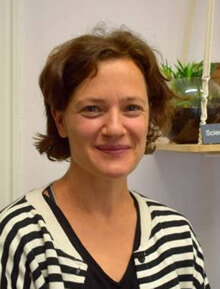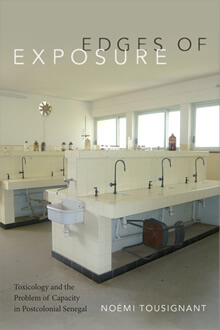
Fleck Prize 2020: Noémi Tousignant
The Fleck Prize committee of the Society for Social Studies of Science is delighted to award Noémi Tousignant the 2020 Ludwik Fleck Prize for her book Edges of Exposure: Toxicology and the Problem of Capacity in Postcolonial Senegal (Duke University Press 2018). The Fleck Prize, first awarded in 1992, recognizes an outstanding book in the area of Science and Technology Studies (STS). The committee evaluated nominated books on their contributions to the field of Science and Technology Studies, their novelty, and their overall scholarly quality.

Offering an historical and relational account of the science of toxicology in Senegal, Edges of Exposure asks why and how the situation has arisen in which toxicology is not able to offer protection, drawing attention to what Tousignant calls unprotection. This is a story, she writes, of scientists’ experiences of loss, and, for some, of new strategies of survival and success. Loss illuminates change; what was, even if only as possibility or memory, but is no longer. It also illuminates value; what is missed. Following lines of loss can thus help us to understand what scientific capacity, both narrowly and broadly defined, means in settings of (threatened) peripheralization,scarcity, dependence, and stagnation.
Working through the absences of missing and possible protections the study offers a combination of interviews, histories, archives, and descriptions of empty laboratories. Exploring successive waves of science struggles and policies after colonialism, Tousignant traces science in the hopeful aftermath of colonial problems of therapeutic inaccessibility and economic/regulatory dependence, followed by the abandonment of public science (and health) in Africa by the state, as it experienced economic crisis from the late 1970s, and, from the 1980s, implemented Structural Adjustment Programmes (of cuts in state spending and liberalization reforms designed to make African economies more competitive), and, more recently, has been only selectively invested in by newly generous global health donors.
Tousignant’s fine-grained and deft descriptive analysis offers a generative counter-account to stereotypical accounts of scientific heroism: giving recognition not only to the futility but also to the persistence, energy, and hopefulness of toxicologists’ pursuit, in Senegal, of toxicology as a public and protective science. Even though that science Ultimately seems largely futile, unable to generate protective knowledge other than as fragments, hopes, and fictions. Still, these fragments count; they map the partial contours of a landscape of exposure, pointing not merely to the absence of capacity and protection but to its edges where knowable toxicities circulate, uncaptured by analytical equipment.
Challenging global environmental health policies and governance, the study traces a situation where protection from toxicity figures more as a form of moral imagination (or fiction) in which opportunities to protect from (and to politicize) toxic risk are withheld. Tousignant’s work is a plea to invest in toxicological research on contamination and exposure in Africa, so that countries such as Senegal will be able to use and develop their own local scientific capacities to protect populations from contemporary toxic exposures rather than responding only to global priorities.
An eloquent, engaged, timely and artful contribution to science studies, Edges of Exposure brings to science studies a generative and human exploration of the science of unprotection, in which unprotective toxicologies are the effects of successive waves of global political economics that have treated Africa, and Africans, as waste. Situating the study as a specifically African iteration of the wider global toxic ignorance yielded by regimes geared to under-testing in countries of the north, Tousignant makes the case that the corporate agents who are polluting air, soil, water, plants, animals and people cannot be held to account when there is systematic underfunding of the protective sciences required for countries to fulfill their responsibilities in various international treaties on toxicology. A study of one African instantiation of the globally persistent problem that scientific institutions may be designed to be powerless, to render a politics of toxicity impossible, Tousignant calls for environmental global policies to be backed up by investment in toxicological sciences. Detailing the relations between science and state and the dedication that is needed for science to provide the data needed for rights and regulations to have effect, Edges of Exposure opens new avenues for science studies in worlds of absence, failure and ignorance, situating toxicological sciences in all-too-human worlds where corporates and elites elude accountability by design.
Noémi Tousignant’s unique study of the relations between science and state in Senegal, located in successive global political-economic waves post-1960 to present, enables us to attend to remnants and residues encountered in situ, in the laboratory, to activate pasts, presents as well as futures of engaged science, making Edges of Exposure the recipient of the Fleck Prize 2020.
Fleck Committee 2020: Lesley Green, Gloria Baigorrotegui, Maka Suarez, Noortje Marres
Acceptance Statement
Every time I look at the list of past Fleck Prize winners, a fresh wave of astonishment washes over me. These books and their authors are beacons; the influence of some exceeds footnotes, woven into the very ways in which we see, think and write, while still challenging us to keep doing so differently. I’m stunned and honoured that Edges of Exposure is joining them.
Many of these books decentre science and technology, looking critically at and away from sites and positions of privilege. Edges of Exposure is a book about the effects of global inequality on capacities to make knowledge in an African place, Senegal. It is also about the inequalities in protection – here, from toxic presences and effects – that result. By setting these inequalities together, I hope that Edges of Exposure helps shake up a lopsided geography of both science and life chances.
Past prize-winners have also pioneered vocabularies and styles of writing, recognising the craftwork in our own ways of knowing. I worked hard, in writing Edges of Exposure, to convey the fine-grained textures of Africa-based scientific spaces, equipment, work, dreams and absences, as material conditions but also as rhythms of activity, refracting and mediating scarcity and subordination into qualities of knowledge and environments.
Leverhulme Trust funding, obtained by Wenzel Geissler and Ann Kelly (and additional support from the UK Economic and Social Research Council, the Wellcome Trust and Canada’s Social Science and Humanities Research Council) gave me the freedom to explore things before I was able to say why they were interesting. They and others around us – John Manton, Ruth Prince, Branwyn Poleykett and Guillaume Lachenal to name a few – helped me find ways of doing so, eventually. For supporting the book, Kim Fortun, Gabrielle Hecht, and Courtney Berger at Duke and the Fleck Prize committee, especially. My family, and the many people in Senegal who let me into their work, lives, records and networks.
At this time of pandemic crisis layered onto ongoing environmental destruction and deepening disparities – along lines of race, class and geography – in distributions of risk and harm, of healthcare, of knowledge/technologies, and of good food, safe housing, green space, breathable air and secure incomes, we need, as ever, to sharpen, innovate and deploy the decentring and future-opening capacities of STS.
Bio
Noémi Tousignant is lecturer in Science and Technology Studies at University College London and currently holds a Wellcome Trust University Award. Her work explores intersections of scientific and health inequality in West Africa. Her current project looks at primary liver cancer as a case of inequality formed through the making of biomedical knowledge about carcinogenic exposures, the deployment of technologies for controlling these, and the privatization of care. She is co-editor, with Wenzel Geissler, Guillaume Lachenal and John Manton, of Traces of the Future: An Archaeology of Medical Science in Africa, and of journal special issues on insects and science, as well as on urban health workers, health capacity, and medical dreams in Africa. Edges of Exposure is her first monograph.

